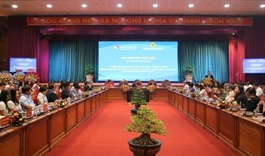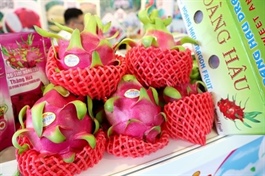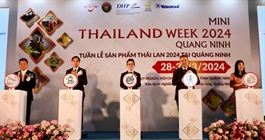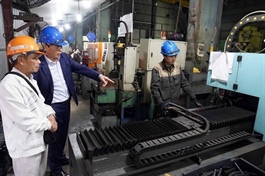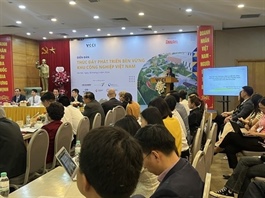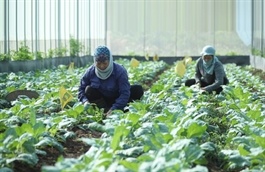Export picture brightening in Q1
Export picture brightening in Q1
Export performance in the first quarter of this year has exposed bright spots with diverse sectors managing positive growth. Businesses, however, have also spotted ‘dark areas’ and need to come up with suitable remedies.

On March 19, Vinh Hiep Co., Ltd. exported two containers of organic coffee to Japan, one of the most demanding export markets that mandates stringent quality requirements for agricultural products.
After two years of negotiation, Vietnam’s first shipment of organic coffee officially forayed into the Japanese market, with a price 30 per cent higher compared to regular coffee.
A rebound in order intakes has helped diverse billion-dollar export sectors to manage fair growth in the first quarter (Q1).
For instance, as of March 15, the local coffee industry raked in $1.57 billion in total export value, a 61 per cent jump on-year, and is estimated to hit $1.9 billion in the whole quarter, setting a record.
Besides coffee, shipments of diverse export sectors continually reaching the global markets are creating motivation to beef up production.
The textile apparel sector, after missing its $44 billion export target in 2023, is witnessing rosier signs, with Q1’s figure estimated to approximate $9 billion.
Than Duc Viet, CEO of Garment 10 Corporation, under state conglomerate Vinatex, revealed that exports were hailing brighter signs compared to last year, yet difficulties persist in the face of a complex and unpredictable geopolitical situation.
“We have many export shipments to the US and EU markets which incur impacts from conflict on the Red Sea. At the moment, the impacts remains insignificant as for export orders to EU, foreign partners bear ship leasing charges and associated costs, yet the longer delivery time might badly influence sale activities of importers,” said Viet.
Garment 10’s current solution is to push up production to be able to make up for extended delivery time due to Red Sea tension.
“2024 is forecast to be another challenging year for the textile apparel sector as total aggregate demand has yet to fully recover. That is why our company is opting for orders of smaller size, yet of high quality, a complex structure and swift delivery,” said Viet.
Meanwhile, Vinatex has shaken hands with foreign partners on the production of special-use products to permeate niche markets. In mid-March the group inked a deal with UK-based group Coats for the production of fire-resistant fabric and garments.
This segment is deemed to secure fast growth pace and enormous potential for development in the context that safety standards have become increasingly stringent in leading global markets.
“Embracing fire-resistance fabric production is one of the steps to navigate out of conventional garment production which incurs stiff competition in pricing,” said Le Tien Truong, Vinatex chairman. “In the near term, Vinatex and UK partner Coats engage in producing fire-resistant garments for G7 markets.”
The latest figures by General Department of Vietnam Customs show that Vietnam’s export value approximated $75.9 billion as of March 15, up 20.6 per cent on-year.
Statistics from the end of February show that 39 out of 45 export items exhibited growth compared to a similar period last year.
The export value of many manufacturing items showcased an impressive double-digit growth, such as timber and wooden furniture up 43.8 per cent, steel and iron up 45.4 per cent, footwear 18.3 per cent, and textile apparel items up 15 per cent.



